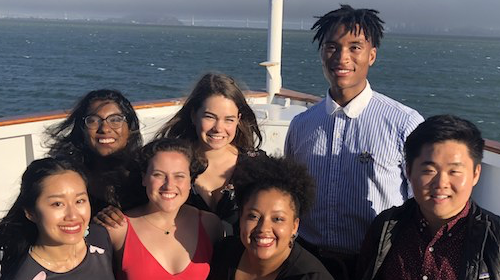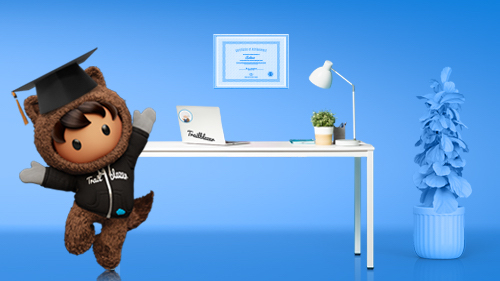As the summer winds down and school starts back up again, we wanted to take a moment to look back at the amazing 12 weeks our #Futureforce interns have had with us. This year, the Content Experience (CX) team at Salesforce hosted six Technical Writing interns from schools across the country. They worked on a variety of projects, from developing content strategies to producing videos for Salesforce users to enjoy around the world. (Yes, they were very busy!)
We couldn't let our interns head back to school without having them share a little about their experience, what new things they've learned this summer, and how they made the most of their time in San Francisco. Here's what they had to say:

Caption: The Content Experience (CX) interns together at one of the Futureforce summer events: a boat cruise around San Francisco Bay.
Cameron Wilkerson — Carnegie Mellon University ‘19
What’s an average day or week been like for you?
- Typically, I get in and grab a bite to eat from the kitchen on my floor, then head to my workspace. I start every day by checking emails, then make a plan for what I want to accomplish that day — based on priority and feasibility. I'm essentially doing one of three things: 1) drafting and editing scripts for new videos, 2) editing videos or recording audio, or 3) writing a script for a new Trailhead project. This summer, I've had the opportunity to create videos that will be seen by hundreds of thousands of Salesforce users across the globe. It feels great to produce meaningful content I'll actually be able to see put to good use. It goes without saying, I never get bored on the job!
Austin Lai — University of Chicago ‘19
How has your background helped you as a Technical Writing intern?
- I’m a Comparative Human Development (CHDV) major now, even though I started out in Cinema and Media Studies during my first two years of school. CHDV teaches me to consider broader questions in the social sciences, like the processes and impacts of social change and the interactions of biology and culture. Cinema and Media Studies introduced me to the world of film criticism and encouraged me to dissect my own writing style. At UChicago, I was a leader in Spoon University, an online publication for college students about food. That's where I found my love for writing and video production. I really enjoy the connection you can make with your audience and, via Spoon University, was able to dabble in different forms of content creation vis-à-vis a love of food. That’s the best skill set I've been able to translate into technical writing at Salesforce. It's been fun adding my own personality and perspective to content that can sometimes be seen as dry or overly technical.

Pictured: Technical Writing intern Austin ready for Day 1 at Salesforce.
Sydney Pujadas — Carnegie Mellon University ‘19
How has your team supported you this summer?
- My team has been amazing! Everyone has always lent a hand whenever I've needed help or had a question about something. My mentor has always given me great advice, too. She told me to approach everything with an open mind and to use my instincts whenever I encounter a problem or a question. In my first two weeks here, I was asked to do a competitive analysis of small business CRM. Part of this involved me onboarding onto Essentials as a new user and documenting what questions popped up into my head as I went through that process. The goal was to experience Essentials as someone who has never used a CRM before. A lot of small businesses we sell to don't have much exposure to CRM tools. One of the things that stood out to me most was that I didn't know what many of the terms meant. So, after talking with my mentor, we decided it would be a good idea to create a glossary of terms. I went ahead and made that glossary — and it ended up being one of the key pieces of our content strategy.

Pictured: Technical Writing interns Vidya and Valerie at a Futureforce Giants baseball game.
Vidya Palepu — Carnegie Mellon University ‘19
What's the best advice you got from your team this summer?
- Know your skill set. Know the value of your own work. Don’t be afraid. In the beginning, I felt uncomfortable not knowing what was going on with the code. I would hesitate to ask people for help because I felt like this was something I should know about. I would tell myself if I just keep on staring at this for 20 more minutes, I will be able to figure it on my own. But that’s not how it works — and that’s why documentation is so necessary. You just can’t stare at something and hope it all works on its own. You need someone to explain it to you. This experience taught me more about my own skills — as well as the gaps in my skills. When subject matter experts would explain concepts to me that I didn't understand at first, it all made complete sense. The way they put it into words was so easy to understand. But it was only when I heard them talk about it that I was able to make sense of it on my own and put it down in writing. That’s where my skill set lies!

Pictured: Technical Writing intern Taylor in front of the Golden Gate Bridge.
Taylor Roper — Howard University ‘20
Did you attend any Ohana group events at Salesforce this summer? What were those like?
- I went to BOLDforce's Shades of Black panel to discuss the multidimensional nature of the Black community, including the African Diaspora, intersectionality, colorism, identity, and more. The first thing I noticed was how many people were there and, more importantly, how many of them were allies. It was an amazing panel; it really showcased the diversity of the Black community. The panelists shared their personal stories and experiences about forming their identities and finding themselves. I could totally relate. At the end of the panel, audience members were able to ask questions, share their own experiences, and express what resonated with them most. Ohana groups are awesome. They're like a “homecoming” for those who can directly relate to and identify with that group. They also provide a safe space for having difficult conversations and asking tough questions. And it's amazing to see all the allies of the group and to feel their support and desire to learn more. Ohana groups are such an important part of Salesforce's culture.
Valerie Yam — Carnegie Mellon University ‘19
What did you do on the weekend in San Francisco?
- I love to explore! So far, I’ve been to CorgiCon, to this event in Oakland called First Fridays, to a Paul McCartney tribute show, and to the Exploratorium. A lot of the time I’ll just go out without a plan in mind and just see where it takes me. There was a Jazz festival a couple of weekends ago, which was pretty cool. Then afterwards, I went to Japantown. This past weekend, I went to the Mission. The neighborhood hosts a Sunday event where all the streets are lined up with different stalls and street performers. A magician even asked me to participate in his show (I was so excited!).




